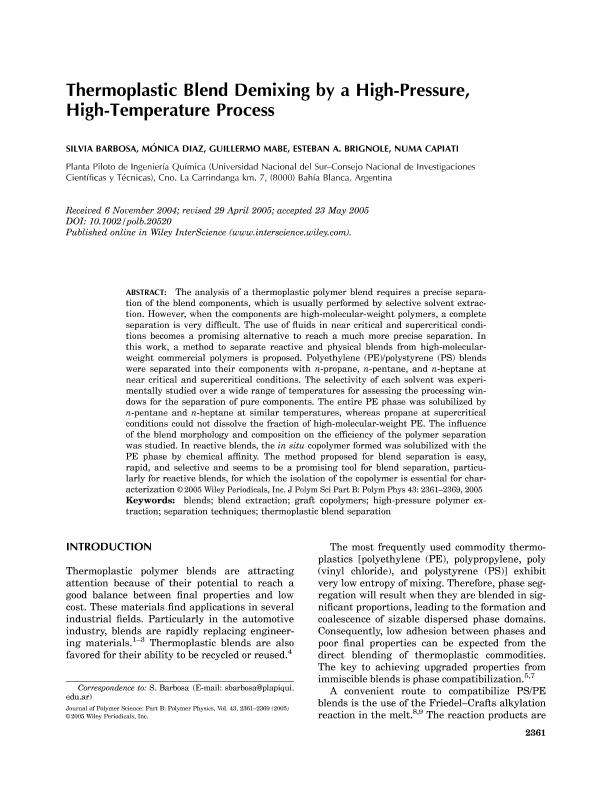Artículo
Thermoplastic blend demixing by a high-pressure, high-temperature process
Barbosa, Silvia Elena ; Diaz, Monica Fatima
; Diaz, Monica Fatima ; Mabe, Guillermo Domingo
; Mabe, Guillermo Domingo ; Brignole, Esteban Alberto
; Brignole, Esteban Alberto ; Capiati, Numa Jose
; Capiati, Numa Jose
 ; Diaz, Monica Fatima
; Diaz, Monica Fatima ; Mabe, Guillermo Domingo
; Mabe, Guillermo Domingo ; Brignole, Esteban Alberto
; Brignole, Esteban Alberto ; Capiati, Numa Jose
; Capiati, Numa Jose
Fecha de publicación:
14/09/2005
Editorial:
John Wiley & Sons Inc
Revista:
Journal of Polymer Science Part B: Polymer Physics
ISSN:
0887-6266
Idioma:
Inglés
Tipo de recurso:
Artículo publicado
Clasificación temática:
Resumen
The analysis of a thermoplastic polymer blend requires a precise separation of the blend components, which is usually performed by selective solvent extraction. However, when the components are high-molecular-weight polymers, a complete separation is very difficult. The use of fluids in near critical and supercritical conditions becomes a promising alternative to reach a much more precise separation. In this work, a method to separate reactive and physical blends from high-molecular-weight commercial polymers is proposed. Polyethylene (PE)/polystyrene (PS) blends were separated into their components with n-propane, n-pentane, and n-heptane at near critical and supercritical conditions. The selectivity of each solvent was experimentally studied over a wide range of temperatures for assessing the processing windows for the separation of pure components. The entire PE phase was solubilized by n-pentane and n-heptane at similar temperatures, whereas propane at supercritical conditions could not dissolve the fraction of high-molecular-weight PE. The influence of the blend morphology and composition on the efficiency of the polymer separation was studied. In reactive blends, the in situ copolymer formed was solubilized with the PE phase by chemical affinity. The method proposed for blend separation is easy, rapid, and selective and seems to be a promising tool for blend separation, particularly for reactive blends, for which the isolation of the copolymer is essential for characterization.
Archivos asociados
Licencia
Identificadores
Colecciones
Articulos(PLAPIQUI)
Articulos de PLANTA PILOTO DE INGENIERIA QUIMICA (I)
Articulos de PLANTA PILOTO DE INGENIERIA QUIMICA (I)
Citación
Barbosa, Silvia Elena; Diaz, Monica Fatima; Mabe, Guillermo Domingo; Brignole, Esteban Alberto; Capiati, Numa Jose; Thermoplastic blend demixing by a high-pressure, high-temperature process; John Wiley & Sons Inc; Journal of Polymer Science Part B: Polymer Physics; 43; 17; 14-9-2005; 2361-2369
Compartir
Altmétricas



